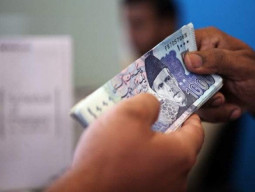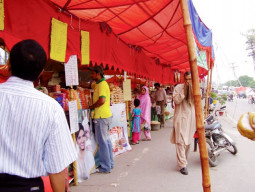
A high-level meeting to discuss tobacco smuggling and illegal cigarette manufacturing was cochaired by Federal Minister of State Ali Pervez Malik and K-P Adviser Muzammil Aslam who revealed that billions of rupees were being lost in revenue due to such practices.
The meeting was attended by the excise minister of Khyber Pakhtunkhwa, representatives from the Federal Board of Revenue (FBR), Pakistan Tobacco Board, and tobacco companies.
During the meeting, a detailed discussion was held on tobacco smuggling and illegal cigarette manufacturing, highlighting the significant revenue loss of over Rs567 billion to the country over the past decade. Furthermore, the severe health risks associated with these illicit activities were emphasised.
The meeting resulted in key agreements between federal and provincial government representatives, including strengthening the estimation process to prevent illicit tobacco cultivation, enhancing track and trace mechanisms for implementing better tracking systems to monitor tobacco products and data sharing for improved Surveillance for facilitating data sharing to enhance surveillance on cigarette exports.
The finance adviser emphasised that KP's nominal provincial excise duty on tobacco is ring-fenced to support health service delivery in the province. He encouraged manufacturers to withdraw their legal challenges and engage in constructive dialogue for a mutually beneficial resolution.
The meeting concluded with the formation of a special technical committee to prepare a comprehensive action plan for the implementation of the decisions made. The active role of the Khyber Pakhtunkhwa government in revenue protection was also appreciated.
Tobacco smuggling in Pakistan poses significant challenges to public health and the economy. Recent data indicates that the illicit cigarette trade constitutes approximately 33% of the total market, with smuggled brands accounting for 12%.
The Federal Board of Revenue (FBR) has implemented a Track and Trace System (TTS) to combat this issue. As of 2023, tax stamps were found on 55% of cigarette packs, with higher compliance in urban areas (71%) compared to rural regions (48%). This partial implementation has shown promising results in reducing the sale of untaxed cigarettes.
Despite these efforts, the illicit trade persists, leading to substantial economic losses. From July to November 2023, the legitimate tobacco industry's output declined by 40%, attributed largely to the rise in illegal tobacco products. This downturn has resulted in significant tax revenue losses for the government.
The situation is exacerbated by the proliferation of new, unregulated cigarette brands. Following a substantial increase in the Federal Excise Duty (FED) on cigarettes, over 70 new brands emerged within two months, offering cheaper alternatives and attracting price-conscious consumers.
To address these challenges, the FBR plans to extend the TTS to all cigarette manufacturing units nationwide. Additionally, there is a proposal to penalize retail outlets selling cigarettes without tax stamps, aiming to curb the distribution of illicit products.
Combating tobacco smuggling in Pakistan requires a multifaceted approach, including stringent enforcement of existing laws, comprehensive implementation of tracking systems, and public awareness campaigns to reduce the demand for illicit products. Such measures are essential to safeguard public health and recover lost economic revenue.
























COMMENTS
Comments are moderated and generally will be posted if they are on-topic and not abusive.
For more information, please see our Comments FAQ